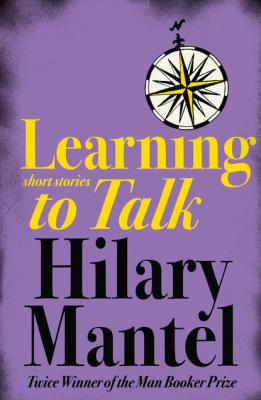Learning to Talk. Hilary Mantel
Читать онлайн.| Название | Learning to Talk |
|---|---|
| Автор произведения | Hilary Mantel |
| Жанр | Контркультура |
| Серия | |
| Издательство | Контркультура |
| Год выпуска | 0 |
| isbn | 9780007354887 |
Learning to Talk
Short Stories
Hilary Mantel
Fourth Estate
An imprint of HarperCollinsPublishers
1 London Bridge Street
London SE1 9GF
First published by Fourth Estate in 2003
Copyright © Hilary Mantel 2003
‘King Billy Is a Gentleman’ first appeared in New Writing 1992, Minerva in association with the British Council, 1992; ‘Destroyed’ first appeared in Granta (63), 1998; ‘Curved Is the Line of Beauty’ first appeared in TLS (No. 5157), 2002; ‘Learning to Talk’ first appeared in London Magazine, 1987; ‘Third Floor Rising’ first appeared in The Times Magazine, 2000; ‘The Clean Slate’ first appeared in Woman & Home, 2001
Hilary Mantel asserts the moral right to be identified as the author of this work
A catalogue record for this book is available from the British Library
All rights reserved under International and Pan-American Copyright Conventions. By payment of the required fees, you have been granted the non-exclusive, non-transferable right to access and read the text of this e-book on screen. No part of this text may be reproduced, transmitted, downloaded, decompiled, reverse engineered, or stored in or introduced into any information storage and retrieval system, in any form or by any means, whether electronic or mechanical, now known or hereinafter invented, without the express written permission of HarperCollins.
HarperCollinsPublishers has made every reasonable effort to ensure that any picture content and written content in this ebook has been included or removed in accordance with the contractual and technological constraints in operation at the time of publication.
Source ISBN: 9780007166442
Ebook Edition © OCTOBER 2012 ISBN: 9780007354887
Version: 2019-06-07
Once again with love
to Anne Terese:
and her daughter:
and her daughter.
Table of Contents
Excerpt from Wolf Hall by Hilary Mantel
I cannot get out of my mind, now, the village where I was born, just out of the curl of the city’s tentacles. We were too close to the city for a life of our own. There was a regular train service – not one of those where you have to lie in wait and study its habits. But we did not like the Mancunians. ‘Urban, squat and packed with guile’ I suppose was our attitude; we sneered at their back-to-back accents and pitied their physiques. My mother, a staunch Lamarckian, is convinced that Mancunians have disproportionately long arms, as a result of generations of labour at the loom. Until (but this was later) a pink housing estate was slammed up, and they were transplanted in their hundreds, like those trees plucked up for Christmas whose roots are dipped in boiling water – well, until then we did not have much to do with people from town. And yet if you ask me if I was a country boy – no, I wasn’t that. Our huddle of stones and slates, scoured by bitter winds and rough gossip tongues, had no claim on rural England, where there is morris dancing and fellowship and olde ale flowing. It was a broken, sterile place, devoid of trees, like a transit camp; and yet with the hopeless permanence that transit camps tend to assume. Snow stood on the hills till April.
We lived at the top of the village, in a house which I considered to be haunted. My father had disappeared. Perhaps it was his presence, long and pallid, which slid behind the door in sweeps of draught and raised the heckles on the terrier’s neck. He had been a clerk by profession; crosswords were his hobby, and a little angling: simple card games, and a cigarette-card collection. He left at ten o’clock one blustery March morning, taking his albums and his tweed overcoat and leaving all his underwear; my mother washed it and gave it to a jumble sale. We didn’t miss him much, only the little tunes which he used to play on the piano: over and over, ‘Pineapple Rag’.
Then came the lodger. He was from further north, a man with long slow vowels, making a meal out of words we got through quite quickly. The lodger was choleric; his flashpoint was low. He was very, very unpredictable; if you were going to see the shape of the future, you had to watch him carefully, quiet and still, with all your intuitions bristling. When I was older I became interested in ornithology, and I brought into play the expertise I had picked up. Again, that was later; there were no birds in the village, only sparrows and starlings, and a disreputable tribe of pigeons strutting in the narrow streets.
The lodger took an interest in me, getting me outside to kick a football around. But I wasn’t a robust child, and though I wanted to please him I hadn’t
